Artistic Motivations Exhibitions: Boats Exhibition Kalamazoo Institute of Arts Preliminary Study Water
by David Jay Spyker
leave a comment
“Cradle” Displayed in “Copley to Kentridge: What’s New in the Collection?”
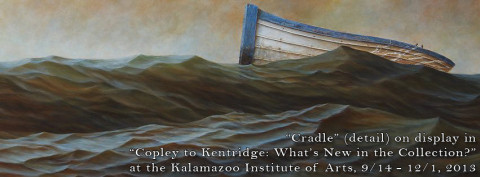 The painting, Cradle, joins more than 100 other recently acquired works in “Copley to Kentridge: What’s New in the Collection?” at the Kalamazoo Institute of Arts.
The painting, Cradle, joins more than 100 other recently acquired works in “Copley to Kentridge: What’s New in the Collection?” at the Kalamazoo Institute of Arts.
Completed in 2011, Cradle entered the permanent collection of the KIA in 2012. It will hang with works by notable artists such as George Tooker, John Singleton Copley, Robert Mapplethorpe, Jackson Pollock, Stephen Hansen and many others.
In 2012, Cradle won 1st place at the Regional Fine Arts Competition at the Carnegie Center for the Arts in Three Rivers, Michigan. It also took the 2nd place award at the Michiana Annual Artist Competition (10th MAAC) at the Box Factory for the Arts in St. Joseph, Michigan the same year.
Whether it’s a river, one of the Great Lakes, the ocean… water, to me, is an expression of spirituality, healing, and the timeless power of nature. It might represent a journey, or reference change over the course of time. It’s the source of life for all living things, and at the same time can engender something primeval and elicit emotions of unease or even danger.
The title of a piece has always been very important to me. When I choose a title, it comes from my own personal understanding of the painting. The meaning may not be immediately apparent on an outward level, but the title should reference my own thoughts and feelings about the image. Very often, the title will point to several different meanings, and when it does I feel I’m really getting something right.
In Cradle, I’ve used the boat as a metaphor for both the individual and humanity as a whole. The old boat also has the shape of a cradle of sorts. It carries us on the water, which here represents all of life. The water becomes a cradle for the boat, and encompasses birth, life, and death.
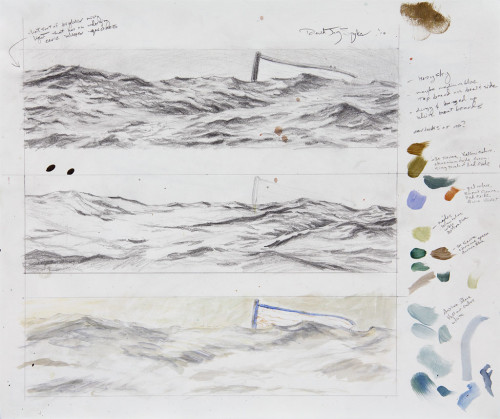
Study for “Cradle”, 2010, graphite, watercolor, and acrylic on paper, 14 x 16.5 in., by David Jay Spyker
When Cradle was at the 2012 competition in St. Joseph, Michigan, a woman who was part of a creative writing group there came up to me and said they each had to choose a piece in the show and write a story based on it. She chose Cradle, and said she imagined there was a man lying in the boat, that he had been there a long time, and whether he was alive or dead was something of a mystery. I felt Cradle conveyed a sense of strange mystery as well, so hearing what she said was encouraging.
Thoughts and especially emotions are something I’m trying to conjure when someone looks at my art, so people’s interpretations of my paintings – learning what kind of thoughts and feelings they have when they engage with it – that’s always interesting.
“Copley to Kentridge: What’s New in the Collection?” is on display 9/14 – 12/1, 2013 at the Kalamazoo Institute of Arts, 314 S. Park St., Kalamazoo, MI 49007.
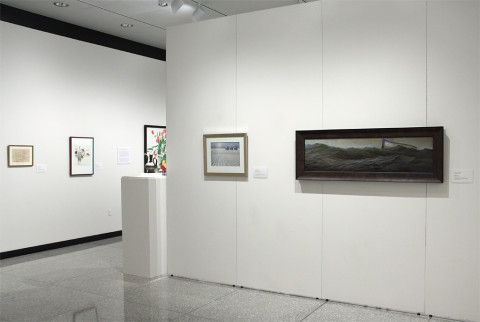

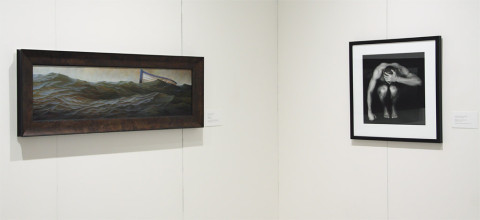
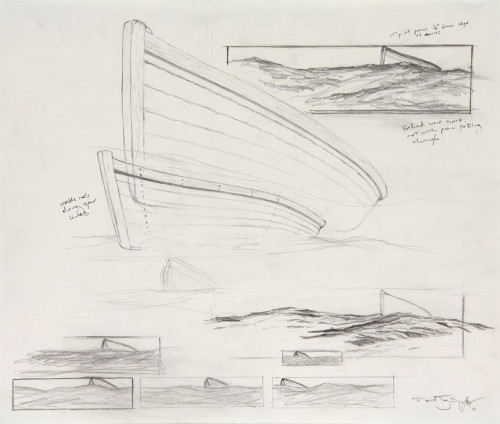
Leave a Reply